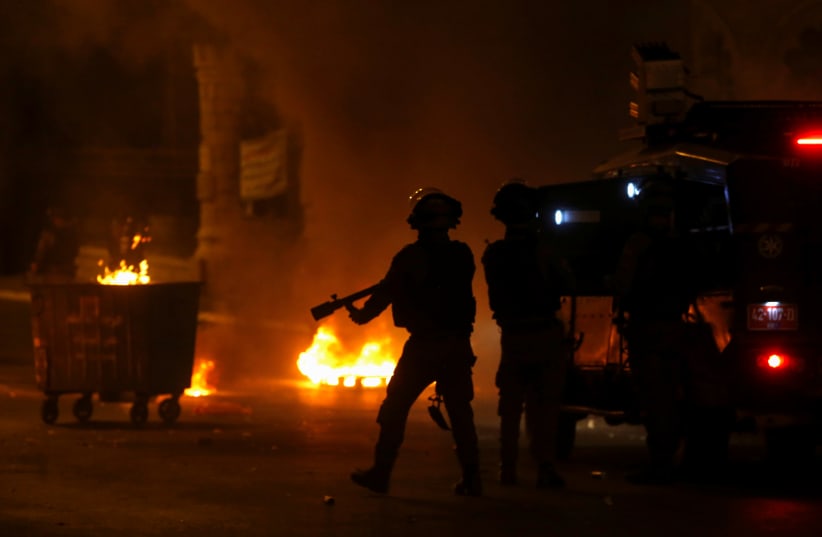Military Intelligence warned that Hamas would fire rockets on Jerusalem and that the country might find itself at war with the terror group.
A month before Hamas launched its rockets in this latest round of fighting, military intelligence (AMAN) recognized that the narrative on Jerusalem as well as the canceled Palestinian elections had inflamed the Palestinian streets.AMAN also recognized that the barricades set up by the Israel police at Damascus Gate preventing people from sitting in the plaza and the cry by Hamas military leader Mohammed Dief to come “rescue” Jerusalem only further escalated the tension.With the group calling for the renewal of border protests along with the launching of incendiary balloons, as well as sending rockets towards Israel, they recognized Hamas’s willingness to play an active role when it came to the holy city.Compounded with Jerusalem Day and its contentious flag parade and looming eviction of dozens of Palestinians from their homes in the east Jerusalem neighborhood of Sheikh Jarrah, military police recommended several precautions. One of them being moving the route of the parade.Dief, the military commander of the Izzadin al-Qassam Brigades, the military wing of Hamas, on Monday threatened Israel with an ultimatum, warning that the group would attack if Israeli security forces did not leave the Temple Mount and Sheikh Jarrah by 6 p.m.The police did not leave and the rockets came as thousands of Israelis were parading through downtown celebrating Jerusalem Day.Doing so was a significant achievement for the terror group, the military believes.An assessment by AMAN found that Hamas leader Yahya Sinwar chose to fire the rockets despite not wanting a war with Israel. The firing of the rockets was a risk that he was willing to take because it showed that the terror group would defend Jerusalem and the Palestinian people.Nevertheless, the launching of the rockets has led to a massive bombardment of strategic assets belonging to the group, as well as the killing of senior commanders, some of them said to be irreplaceable.In the days since the IDF began Operation Guardians of the Walls, the military has destroyed thousands of kilometers of tunnels used by the group as command and control centers, as well as both offensive and defensive tunnels. The group’s “Metro”, which was used to move weapons and fighters, was also destroyed.Hamas has spent years building up their underground infrastructure, and one of the goals of this current operation is to either destroy all tunnels or turn the remaining ones into a place where Hamas no longer feels safe.Hundreds of operatives belonging to Hamas and Palestinian Islamic Jihad have been killed in the airstrikes. Several senior commanders have also been killed and others targeted in strikes, in some cases more than once. Military Intelligence has so far identified 85 terrorists by name, 20 of them in key positions.“We have killed dozens of senior Hamas and Palestinian Islamic Jihad members, which has given their leaders a feeling that they are being chased. This makes it difficult for them to operate and to continue commanding the battle,” the senior IDF officer said.The rocket production and manufacturing infrastructure belonging to both Hamas and Palestinian Islamic Jihad has been struck to a degree where PIJ has been set back years and Hamas several months. The loss of senior terrorists who have been killed in airstrikes set back Hamas’s research and development by years .The IDF has also destroyed hundreds of rockets and rocket launchers, but Hamas and PIJ combined are said to have around 14,000 rockets and mortars.A senior officer told reporters on Friday that though the group had planned several “surprises,” such as cross-border raids or suicide drone attacks, all had been foiled.“We have disrupted their operational plans. We stopped the threat of incursions, intercepted attacks using drones and unmanned aerial vehicles and we struck a serious blow to Hamas’s underground capabilities,” he said.While neither side wants the fighting to deteriorate into a war with a ground incursion by IDF forces, Hamas has enough rockets to continue firing for at least two months.And that is why, the senior officer said, “We are prepared with quality targets for a long time and for a long campaign. We will continue to exact from Hamas a price.”
IDF Military Intelligence knew Hamas would fire on Jerusalem
While neither side wants the fighting to deteriorate into a war with a ground incursion by IDF forces, Hamas has enough rockets to continue firing for at least two months.
